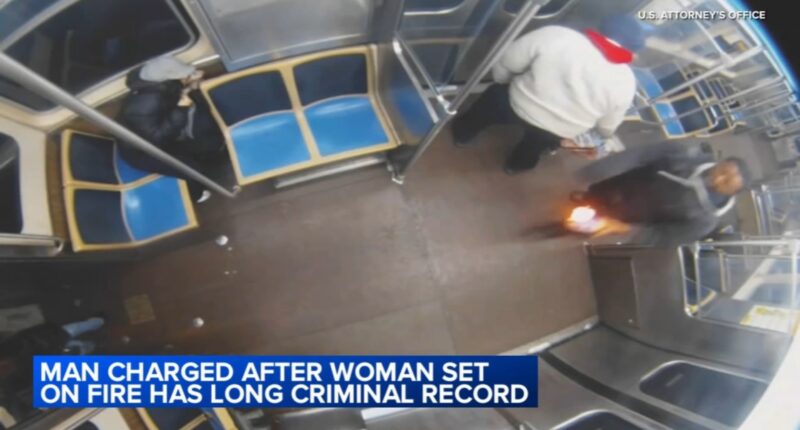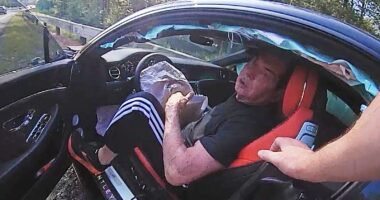Share this @internewscast.com
CHICAGO — New details have emerged regarding the man accused of setting a woman ablaze on a CTA train earlier this week. The suspect, who has a lengthy legal history and documented mental health issues, is now at the center of a troubling case.
As the victim continues to receive medical care, her family has released a public statement addressing the incident.
ABC7 Chicago is now streaming 24/7. Click here to watch
The frightening event occurred Monday night on the CTA Blue Line as the train approached the Clark and Lake station in downtown Chicago.
The accused, Lawrence Reed, has faced at least 14 criminal cases in Cook County since 2017, including six charges related to battery.
Court documents suggest that Reed may be experiencing homelessness and battling mental health challenges.
During a Wednesday court session, federal investigators provided a stark portrayal of the individual they allege is responsible for the attack on the 26-year-old woman.
“Lawrence Reed had no business being on the streets given that his violent criminal history and pending criminal cases. Reed had plenty of second chances by the criminal justice system, and as a result we have an innocent victim in the hospital fighting for her life,” said Chris Amon, special agent in charge with the Bureau of Alcohol, Tobacco, Firearms and Explosives.
A records search of Reed led to a long list of mugshots associated to crimes ranging from driving on a suspended license to battery.
In 2020, he was sentenced to a 24-month mental health probation after setting a fire outside the Thompson Center. And just a few months ago, in August, he was placed on electronic monitoring after he allegedly struck a social worker while “being held in the MacNeal Psychiatry Hospital” in Berwyn.
“It’s not punishment that is going to change the behavior,” said Dr. David Olson, a professor of criminology at Loyola University.
Olson explained why Reed was likely freed rather than held pending his trial, as had been sought by prosecutors in that case.
“It could have been the determination that given his circumstances being incarcerated versus continuing in whatever treatment programs they had would have been beneficial,” Olson said.
In court Wednesday, Reed’s erratic behavior included yelling several times “I plead guilty” while also insisting he would represent himself. It raised the question of whether his competence could make it hard to secure a conviction.
“I’m not aware of him ever being declared mentally incompetent in connection with any of the other extensive criminal history,” U.S. Attorney for the Northern District of Illinois Andrew Boutros said.
ABC7 Chicago legal analyst Gil Soffer said there is a very high bar to declare someone mentally unfit. The charge against him, however, one of committing an act of terrorism on a mass transportation system, is very straightforward.
“The government has to show he committed an act intending to cause bodily harm or death and that he did so on a vehicle of mass transit,” Soffer said.
It’s a charge that’s never been applied in Chicago before, but one that carries with it the possibility of a life sentence.
“It’s almost certainly the heaviest charge the government could have brought. And it’s not a reach for them. As long as he had the mental capacity to do what he’s charged with doing, the government could prove these elements of the crime,” Soffer said.
Reed is expected back in court Friday morning, when a judge will decide whether to keep him incarcerated pending his trial. He has been ordered to undergo both a physical and mental evaluation ahead of that hearing.
Cook County Health shared the following statement from the victim’s family with ABC7 Thursday evening:
“We would like to thank everyone for their prayers and well-wishes as our daughter receives care for injuries sustained earlier this week. We are also grateful for the excellent care and support of the burn team at Stroger Hospital. We will not be providing updates at this time, and ask for her – and our – privacy as we focus our attention on her and her recovery. Thank you.”

















